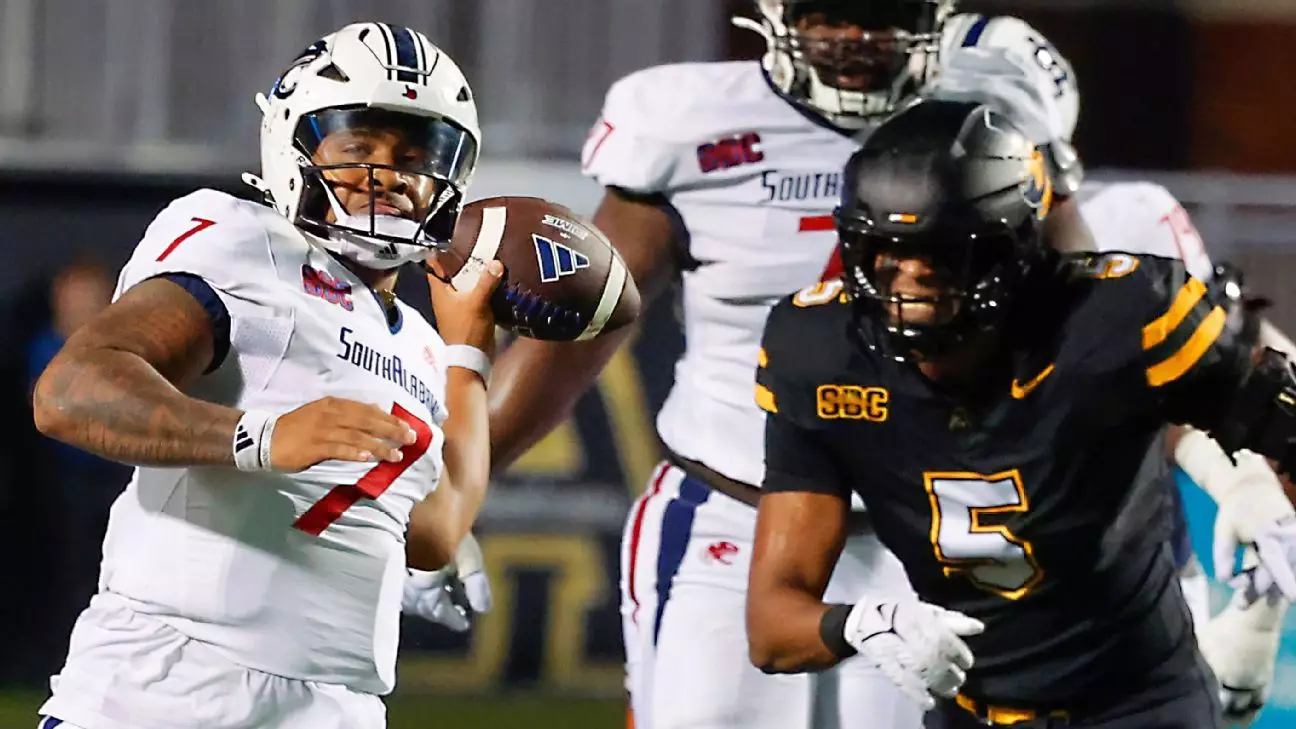In the ever-dynamic landscape of college sports, few events command attention quite like the transfer portal. With the swiftness of a quarterback evading a sack, former South Alabama quarterback Gio Lopez has committed to North Carolina, sending ripples throughout college football. This unexpected move comes as many anticipated the end of a lengthy quarterback search for the Tar Heels, now led by the ambitious first-year coach Bill Belichick. Lopez, ranked as the No. 6 available transfer by ESPN, represents not just an addition to the roster but a seismic shift in the program’s direction—one that raises questions about the current state of talent acquisition in college football.
Lopez’s switch from South Alabama, where he had an impressive breakout redshirt freshman season, to North Carolina, is emblematic of a broader trend in college sports. Athletes are more empowered than ever to seek out the best opportunities for their careers, often leaving programs in their wake. While some view this as a mere business decision, I argue it speaks volumes about the integrity—or lack thereof—within the collegiate sports framework. Are we losing the spirit of college athletics, or is this merely an evolution of the system?
Contracts and Commitments: The Business of College Football
The financial terms of Lopez’s deal with North Carolina—a two-year contract worth $4 million—illustrate how critically the landscape has shifted. What was once an amateur pursuit has become a lucrative profession for athletes who can leverage their talent in a marketplace eager for fresh faces. With three seasons of eligibility remaining, Lopez’s contract positions him both as an immediate starter and a future investment for the Tar Heels. Is this the new normal? Should we accept that big money is now an intrinsic part of the college athlete’s narrative?
Moreover, the fact that North Carolina took the initiative to reach out to Lopez back in March speaks volumes about their recruiting strategy under Belichick. While he inherits a roster with other quarterback prospects like Max Johnson and Ryan Browne, the quick resolution of Lopez’s commitment reflects a decisive approach that could set a tone for the entire program moving forward. The pressure is palpable; succeeding in a high-profile environment comes with expectations that can either propel a coach’s career or lead to a swift exit.
The High Stakes of Expectations
For Lopez, the stakes have never been higher. Here’s a young player, only a season removed from a stellar campaign in which he threw for over 2,500 yards and demonstrated dual-threat capability, now being thrust into the limelight of a Power 5 conference. Expectations are rife, and the competitive nature of the ACC adds a complex layer of intricacies. Can Lopez adapt to this new level of play? Will he be able to replicate or even exceed his prior achievements in an environment where pressure is amplified?
The Ter Heels’ previous quarterback situation was plagued with uncertainty, showcasing a roster filled with quarterbacks who lacked definitive starting experience. Lopez now emerges not just as a player but as a symbolic figure of hope for a fanbase yearning for stability at the quarterback position. However, that hope comes with the weight of performance—one misstep could tarnish not only his reputation but also Belichick’s early tenure.
The Ripple Effects of the Transfer Portal
As Lopez embarks on this new chapter, it prompts discussions on the larger implications of the transfer portal and its effects on traditional college football power dynamics. Programs like Georgia and LSU expressed interest, offering Lopez a chance to compete for a starting role in their highly regarded football ecosystems. This instantly places North Carolina in a more competitive light, forcing programs to reevaluate their recruitment strategies, retention efforts, and overall talent management.
In essence, the transfer portal is no longer just a tool for players seeking change; it has become a battlefield for coaches and management striving to create a winning culture. For schools, navigating this new territory requires not only a solid scouting apparatus but also a keen understanding of player psychology. The days of athletes simply committing to schools for four years may be fading.
Gio Lopez’s commitment to North Carolina is not merely a focal point in his career; it symbolizes the earth-shattering evolution of college football as a multi-faceted enterprise, rife with potential, competition, and unrelenting pressure. In this rapidly shifting dynamic, one thing is certain: the game is not just being played on the field but also in the boardroom, lobby, and beyond.


Leave a Reply